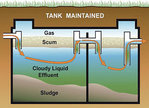

BRUSH PRAIRIE – As federal laws and local crackdowns have reduced large-scale sources of water pollution, focus has gradually shifted to broader, smaller-scale pollution sources that have a big cumulative footprint.
“Before the Clean Water Act in the 70s, you had a lot of point-source pollution,” Eric Lambert, Small Acreage Program Coordinator at Washington State University’s Clark County Extension office. “You could point to something and say … there’s that factory or there’s that municipal waste plant over there polluting the water.”
Lambert addressed a auditorium full of curious Clark County landowners at Prairie High School during a workshop to certify individuals to inspect their gravity-fed home septic systems in September.
The WSU Extension’s Small Acreage Program helps local landowners improve several aspects of their property. Four well and septic workshops are held every year, usually beginning in the spring and ending in early fall. Other programs include workshops on beekeeping, raising beef, pasture maintenance, and several more.
There are nearly a million home-based septic systems across the state. When properly maintained, they protect against illnesses and pollution by keeping waste contained; but malfunctioning septic systems are a serious issue that have contaminated ground water, forced the closure of fisheries and shellfish harvests and sickened people through contamination.
“Today, non point-source pollution is actually our leading cause of water pollution and some sources put that as high as 65 percent of water pollution occurring today,” Lambert said. “What that says to me is we are all kind of part of the problem; but, we can all be a part of the solution, too. That’s the good news.”
Clark County is one of few counties in the state which allows individuals to inspect their own systems. Only gravity-fed systems are eligible and homeowners are only allowed to conduct every-other inspection, so professionals still take a periodic look at the systems just in case.
“The training helps home and property owners protect their property, health and drinking water,” said Chuck Harman, Public Health program manager. “Properly maintaining septic systems and wells helps ensure they will run effectively and provide long-term service.”
Landowners from all over the county scribbled notes about runoff, ground water contamination, and proper maintenance of septic systems. As a benefit to the homeowners, routine inspections catch small problems before they become major contamination issues which often require thousands of dollars in costly repairs and clean-up.
“Definitely, the more people that are informed about their septic systems, and the impacts their septic systems can have if not properly operating, will benefit Clark County as a whole,” said Brigette Bashaw, lead environmental health specialist with Clark County Public Health.
Clark County resident David Becker took the class out of curiosity and a desire to fully understand how his home infrastructure operates.
“I think, for me, I just wanted to understand how the system worked,” Becker said. “I’ve never had a septic system before … I just wanted to figure out how all the moving parts worked.”
Becker said he studied his home electrical system, his wood stove, and his well; the septic system was the last piece of equipment he had yet to master.
“I know it goes down the hole,’’ Becker said. “What happens after that?”
James Darr, who also attended the class, added economics to the list of benefits the workshop brings.
“(I took it) so I can know if a problem comes up that I can fix before it costs me several thousand dollars,” he said.
Septic safety extends beyond contamination. Earlier this year, one Washington child suffered severe injuries and another died after incident involving poorly secured septic tank lids.
“In addition to effective sewage treatment, it is crucial there are no safety problems with septic systems,” said Jerrod Davis, director of the Washington Office of Environmental Health and Safety. “Property owners and industry professionals must be vigilant to ensure they’re not only working properly, but are always safe and secure.”
Bashaw stressed the need for rural landowners and renters to make sure their wells are inspected and their water quality is tested regularly. Even if one’s own septic system is properly maintained, she said, contamination can occur from other sources.
“A lot of people don’t think about their water as long as it’s coming out of their faucet,” Bashaw said. “A lot of water in the county has never been monitored; the water quality has never been tested.”
There is no regulation which mandates groundwater testing, she said, so many people never schedule it - and that can cause big problems. Wells should be tested annually for bacterial load and every three years for nitrate contamination.
“And we do have pockets of arsenic in the county so if the water has never been tested for arsenic, that really does need to be done,’’ Bashaw said. “(These contaminants), you can’t taste them, you can’t smell them, and there’s no visual indicator that they’re in the water so you have to test for them to know they are there.”
Rural landowners interested in the Small Acreage Program or other WSU Extension services can find more on the WSU Clark County Extension website at ext100.wsu.edu/clark.
“When you see folks practicing these stewardship principles it’s really a win-win,” Lambert said. “It’s great for the animals, their property is looking good and increasing in value, and they are also protecting water quality and protecting and improving their natural resources.”